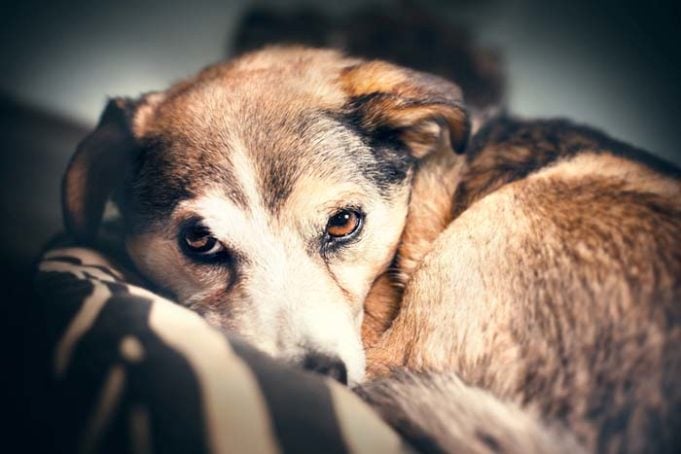Getting a good night’s rest can be an impossible task if your dog keeps you up at all hours. Dogs generally sleep more than we do, and most of the time they're happy to sleep while their owner is at rest as well. If your pet seems to be keeping you awake with midnight shenanigans, you might need to make some changes to your Fido's overall daily life. You don’t need a trainer or a hypnotherapist to help your dog sleep, and small differences in the diet and everyday environment can improve your dog's sleep.
Dogs Thrive On a Routine
Canines enjoy a predictable schedule because it provides them with a sense of security. When a dog knows that she’s going to be fed, let out to use the restroom, and exercised around the same time every day, she also knows exactly what it means when you start getting ready for bed.
When the routine is haphazard, and your dog doesn’t understand that it’s time to settle down at night, there’s a good chance that they’re used to an unpredictable schedule. Try to structure their day into chunks: allow them to use the restroom first thing in the morning, and last thing in the evening. This is also the best time to go for a walk or play some ball since you’re already outside and can tire your pooch more.
Meals should be eaten after your dog has cooled off and stopped panting after playtime. Feeding them beforehand or directly afterward can cause vomiting. Inhaling food and water at a rapid pace can cause bloat, which is a serious condition that's often the reason why dog doesn't sleep properly. Work on this routine for at least two weeks and give your dog time to acclimate to it. Eventually, your pup will be ready for bed as the evening winds down when recognizing it as part of the routine.
Skin Problems Keeping Your Dog Awake
 If your dog has dry, itchy fur, their late night scratching probably keeps you up at night too. This doesn’t always mean your dog has fleas or parasites, though. Sometimes summer or winter allergies and a canine’s genetic makeup result in a lack of oil production, leaving your dog with irritating, itchy patches of flaky skin.
If your dog has dry, itchy fur, their late night scratching probably keeps you up at night too. This doesn’t always mean your dog has fleas or parasites, though. Sometimes summer or winter allergies and a canine’s genetic makeup result in a lack of oil production, leaving your dog with irritating, itchy patches of flaky skin.
There are a few different options that can help resolve this. Adding Omega 3s through fish or fish oil supplements will help to increase the dog’s natural oil production, leaving your pet's fur soft and shiny. You can also rub a small glob of coconut oil through her fur, leave it in for a few minutes, and then rinse it off. Coconut is naturally antibacterial, antiviral, and acts as nature’s own moisturizer. Add coconut oil to your dog’s diet at one teaspoon per 10 pounds; since you’re introducing something new to their diet it’s important to start small to avoid loose bowel movements.
Play Light Music or Television at a Low Volume
 Certain dogs, like rescues, may have come from abusive or traumatic situations. We all know pets have dreams, but did you know that that they can have nightmares too? Canines don’t always understand that when they’re in a loving home, they don’t have to be fearful or anxious of the person who hurt them in the past. Even though you have every intention of giving them the best life possible, they might not feel safe enough to fall asleep, in the dark, with complete silence.
Certain dogs, like rescues, may have come from abusive or traumatic situations. We all know pets have dreams, but did you know that that they can have nightmares too? Canines don’t always understand that when they’re in a loving home, they don’t have to be fearful or anxious of the person who hurt them in the past. Even though you have every intention of giving them the best life possible, they might not feel safe enough to fall asleep, in the dark, with complete silence.
Studies have proven that certain sounds help dogs relax and relieve anxiety. Classical music is one that scientists have successfully tested with dogs. You can also try using specifically designed calming music for dogs found on YouTube. If it doesn’t create a problem for your own sleep schedule, put on a talk show and lower the volume. Or, purchase a white noise machine with a few different soothing options to help lull your pet into a pleasant slumber.
The gentle hum of background noise will help your dog refocus on something positive, rather than falling back into the environment that they had previously lived in.
Give Them a Bed of Their Own
 While some of us don’t mind our dogs sleeping in the same bed with us, it’s definitely not for everyone. This is especially true if you’ve got a very large breed who wants to share your very small, one-person mattress. It’s not necessarily a requirement to provide bedding for canines, but there are benefits to dogs having their own beds, sleeping on the floor every night can become uncomfortable for older dogs. Even if your senior dog still behaves like a care-free 1 year old puppy, their hips and joints won’t stay that way.
While some of us don’t mind our dogs sleeping in the same bed with us, it’s definitely not for everyone. This is especially true if you’ve got a very large breed who wants to share your very small, one-person mattress. It’s not necessarily a requirement to provide bedding for canines, but there are benefits to dogs having their own beds, sleeping on the floor every night can become uncomfortable for older dogs. Even if your senior dog still behaves like a care-free 1 year old puppy, their hips and joints won’t stay that way.
A cushion between your canine and the ground helps to soften the pressure on their limbs and ease any arthritic pain that they may have. If you’ve ever been camping or had to sleep on the floor at some point in your life, you know how sore your body is when you wake up. While dogs certainly can handle hard floor better than us, providing your pooch with a good dog bed will improve your dog's sleep among other advantages.
Check for Neurological Problems
 Most of the time sleep issues in dogs are minor and only require simple solutions. However, situations in which dogs have mental health problems like dementia aren’t always easy to remedy and are difficult to spot. Canines with dementia deteriorate at a fairly rapid pace; they forget how they ended up in certain places, and they aren’t always able to recollect who they know, and who is a stranger. Worst of all, your dog experiences both mental and physical exhaustion, because they’re sleeping all day and wake up feeling confused at night.
Most of the time sleep issues in dogs are minor and only require simple solutions. However, situations in which dogs have mental health problems like dementia aren’t always easy to remedy and are difficult to spot. Canines with dementia deteriorate at a fairly rapid pace; they forget how they ended up in certain places, and they aren’t always able to recollect who they know, and who is a stranger. Worst of all, your dog experiences both mental and physical exhaustion, because they’re sleeping all day and wake up feeling confused at night.
While scientists are still working on finding proper solutions to these mental health problems in dogs, there's a Melatonin supplement you can use. Melatonin is a naturally occurring hormone that has been recommended for dogs with cognitive dysfunctions and cognitive failure as a way to improve a dog's sleep cycle. As long as you purchase a brand that doesn’t contain xylitol and is made for pets, you can give your dog melatonin supplements right before bedtime as recommended on the label. Other options are using regular anxiety aids that may or may not help with the dog's sleep depending on the reasons.
Warning Signs of a Serious Problem
Getting your pet to settle down at night isn’t necessarily an emergency situation. However, if you feel like you’ve tried it all and your dog is still restless at night and you can't find a way how to improve your dog's sleep, it could be a sign of other health complications that cannot be seen by the naked eye. Internal parasites, foreign objects in the stomach, and an array of other possibilities could be preventing your dog from getting a decent sleep. If you feel it’s out of your hands, take them to the veterinarian.
READ NEXT: Why and How Much Do Dogs Sleep?
Disclosure: We may earn affiliate commissions at no cost to you from the links on this page. This did not affect our assessment of products. Read more here and find full disclosure here.














